Your ideal customers could find your business from a lot more keywords than you probably realise.
A good SEO content writer knows how to cover all bases and consider all the keywords customers could be using, e.g. category keywords, bottom of funnel keywords, comparison keywords, and alternative keywords, etc.
We’ll go through these types of different keywords later on in the guide.
The problem with how most SaaS companies do keyword research
As an SEO strategist/copywriter, I spend a lot of my time helping websites brush up their SEO and copywriting.
I’ve dealt with a lot of SEO cases over the years — from the multinational manufacturers hunting for competitive keywords to the small businesses searching for low-volume, local keywords.
Most folks target the wrong keywords because of one common mistake:
They don’t tie their keyword strategy to their business strategy.
Rather than picking their keywords strategically, they simply chase every single keyword related to their niche or industry and hope for the best.
This leads to wasted resources, because you spend all your time gunning for keywords that produce no results.
Start by targeting keywords that tie into your audience’s interests.
The more specific, the better.
Let’s talk about how to target great keywords based on audience interest:
A better way of doing SaaS keyword research
It’s easier to find good, specific keywords if you understand the your customers’ pain points.
“What’s a pain point?” I hear you ask.
Good question.
A pain point is basically a problem or challenge that your customers face. It’s something that causes discomfort, frustration, or a need for improvement.
When people face these challenges, they’ll sometimes search for queries related to their pain points.
The folks over at Grow and Convert call these types of keywords pain-point keywords.
Most of these keywords work the same way:
You simply target the pain-point keyword and present your SaaS product as the solution to alleviate that pain point.
Of course, that’s easier said than done right?
Let’s break it down into three steps:
1. List down the main pain points
Simply note down three or four challenges you help clients solve with your products and services. Start from there.
Pick out the recurring customer complaints, challenges, or frustrations in your niche.
These pain points often translate into keywords.
For example, let’s say we’re running a SaaS company providing a video editing software.
These are some of the challenges customers could be facing when deciding on a video editing software:
- Hard to learn: Some software is difficult for beginners to figure out.
- Expensive: Good video editing software can be costly, and not everyone can afford it.
- Time-consuming: Editing videos can be time-consuming.
- No options for collaborative work: Some software makes it hard for people to edit videos together, which is important for group projects.
2. Brainstorm keyword ideas based on pain points
Once you know what the pain points are, it’s easier to guess what your target audience will be searching.
If you need some help finding ideas, I’d recommend using ChatGPT to brainstorm keyword ideas.
Open up ChatGPT and type in this search query.
I want to write an article targeting <insert your clients and their pain points>. List some examples of keywords my target audience could be searching for.
We can try it out with our SaaS company example:
I want to write an article targeting people looking for cheap video editing software.
List some examples of keywords my target audience could be searching for.

We run our query into ChatGPT and we get this:
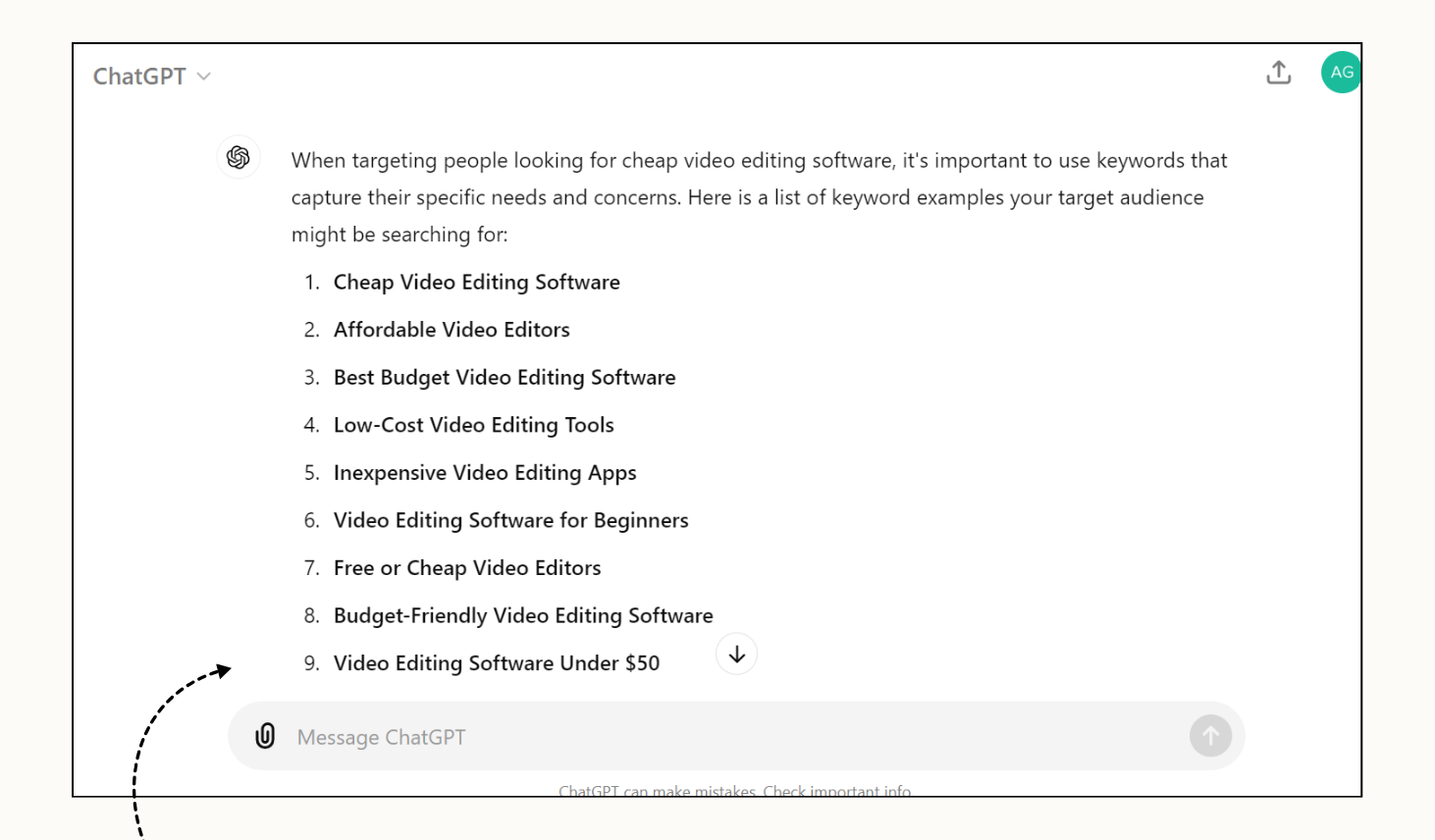
Now these might not be the exact keywords people are searching on Google, but it gives us a good base to start from.
Pick out some keywords from ChatGPT’s list. No more than 5 or 6.
Then you can use Ahrefs’ Keyword Generator to review them one at a time.
If I type this keyword cheap video editing software into Ahrefs’ Keyword Generator, I can get suggestions for similar keywords people are searching.
Two steps.
Step one: type your keyword into the Keyword Generator search bar.

Step two: Pick the keywords that are most relevant and have a good keyword difficulty to search volume ratio.
The best thing about it? Ahrefs Keyword Generator is free. So you don’t even have to pay a dime to get this info.
However, Ahrefs Keyword Generator shows a limited amount of keywords on its free version.
So if you’re looking to tap into more keyword data and opportunities, you’d be better off getting the full version of a keyword tool.
3. Create content that solves pain points
Once you’ve got your keyword, the final step is to create content that perfectly fits what Google and your customers are looking for.
How do you know what they’re looking for?
The top search results for your keyword will give you a clue.
Again, let’s circle back to our video editing software scenario.
A peek at the top 10 pages quickly reveals that comparison posts perform the best for our target keyword cheap video editing software.
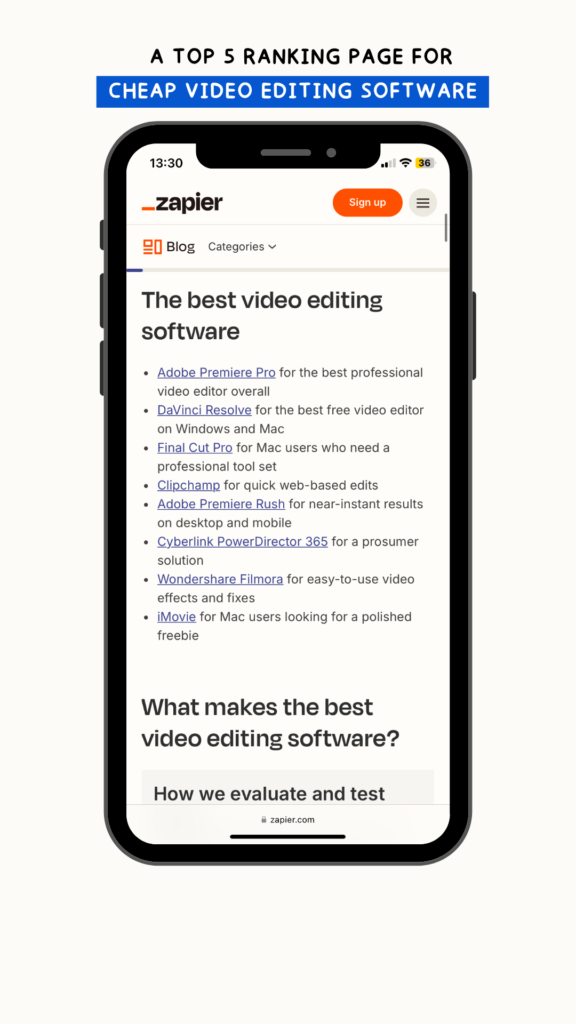
Google’s mission is to deliver the most relevant results. It understands exactly what its users want to see.
In this scenario, people searching cheap video editing software want to see content that compares the best and cheapest video editing software.
A comparison post would work best.
It’d be hard to rank a different content format for that keyword, e.g. a landing page or a Ten Benefits of Using Video Editing Software article.
Try it out yourself.
Look at the top search results for your keyword.
Follow the same format as their content, but make it better.
If it’s a comparison post, knock it out of the park.
If it’s a review, write a better, more detailed one.
Then find a way to pitch your product or service in the content.
I wrote a guide on content angles that breaks down ways you can make your content stand out more. It’s worth a read.
Now it’s easier to find specific pain point keywords like cheap video editing software when you’re selling a product in an industry as popular as video editing.
The more popular the industry, the more variety of searches.
You have more keywords to go after.
That’s why there are so many variations of the keyword video editing software.
This becomes harder when your product is more niche, e.g. time event management software or veterinary software.
And in that case, you’ll need to know about the other keywords you can target:
Types of SaaS keywords
Category keywords
Users searching for these keywords are likely ready to invest in a solution and are looking for the best options in the category.
Example: If your product is a project management software, a good category keyword might be project management software.
But you could break your keywords into smaller categories or target similar variations.
For example, you could target more specific category keywords related to various features (e.g. task tracking, collaboration tools, etc), industry sectors (e.g. IT, construction, etc) or product category variations (e.g. software or apps).
So these are the variations we could target for the keyword project management software, depending on niche:
- task management software
- team collaboration software
- IT management software
- project management software for construction
Comparison keywords
Users entering these queries are in the comparison phase and are actively seeking the best fit for their needs.
An example of a comparison keyword is asana vs. trello.
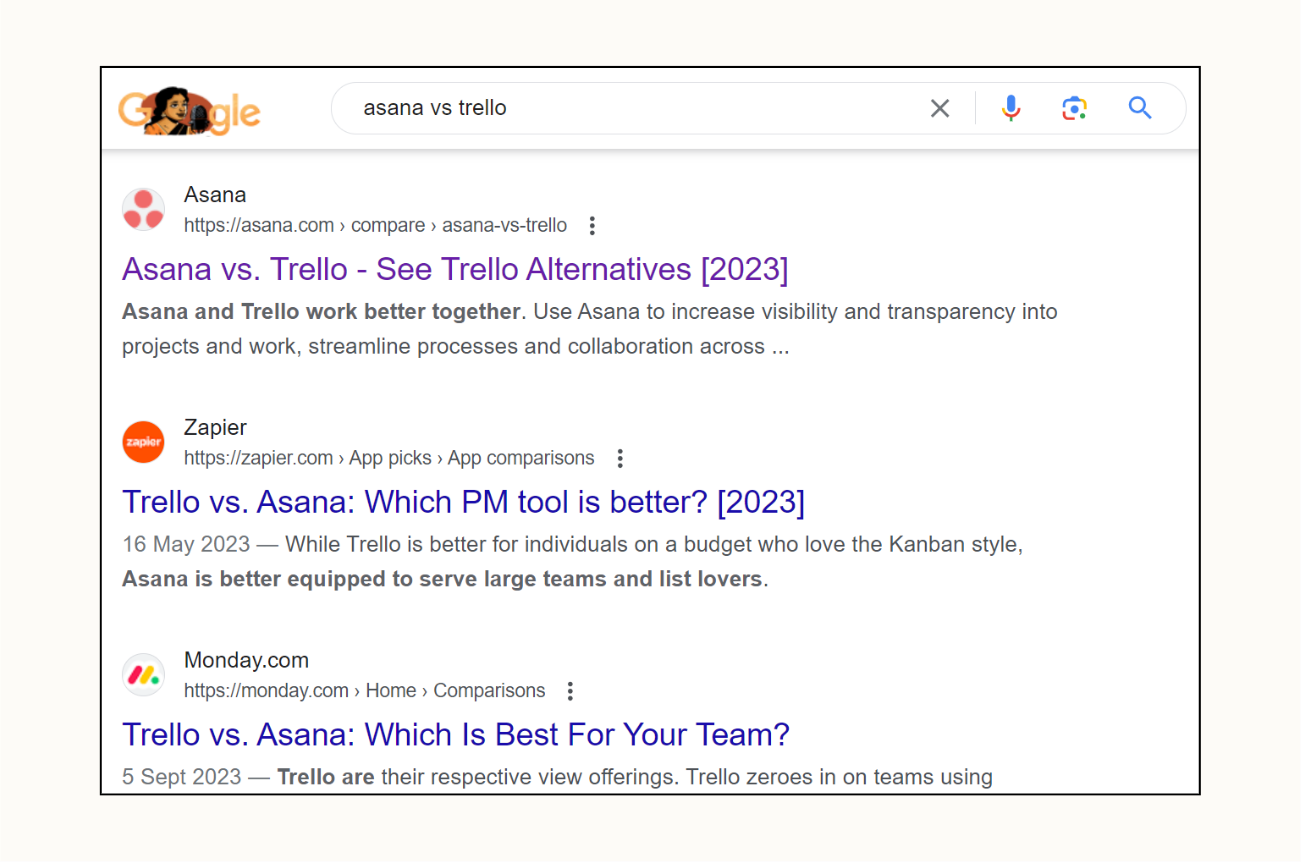
For context, Asana is a widely used project management software.
And Trello is one of their biggest competitors.
They targeted that keyword to attract people who are weighing their options and deciding between Asana and Trello for their project management needs.
And, of course, because it’s an Asana-written article, the content will put more effort to pitch Asana’s software as the go-to solution.
Textbook SEO.
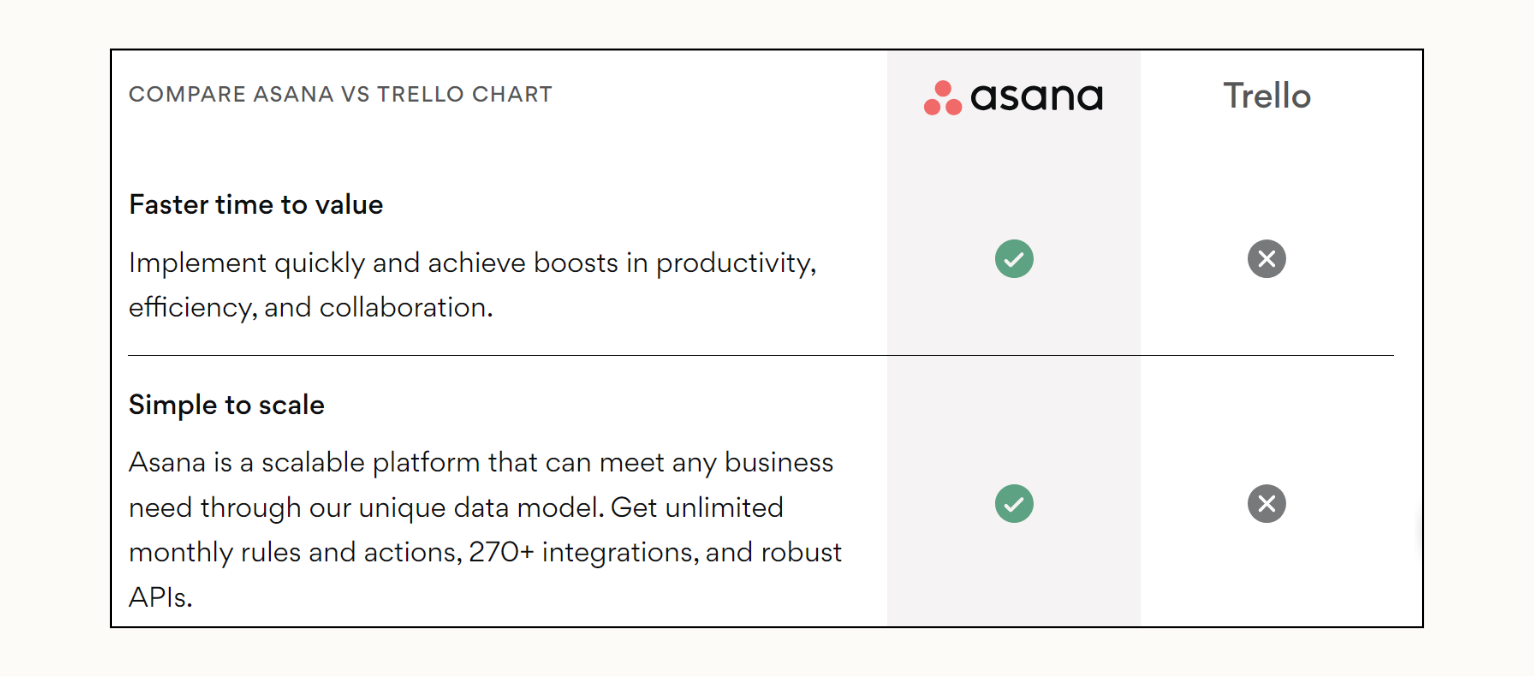
The Searcher is in the decision-making stage and is looking for detailed comparisons to help them choose the best option for their needs.
They want to understand the differences between various products and are searching for insights that will guide their purchase decision.
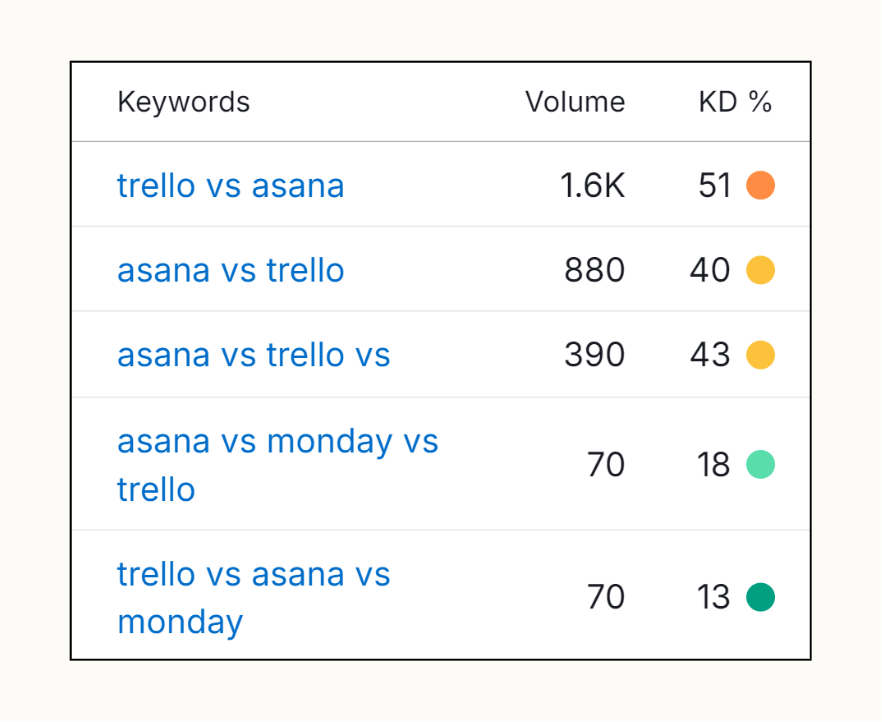
And that’s where you slide into the scene with your product.
Comparison keywords allow you to position your SaaS product as a strong contender in head-to-head comparisons.
And, of course, you’d dig into the benefits, features and differentiators that make your product the winner.
So you talk about the two products the Searcher wanted to review and then your present as the third option.
The final course to those two starters.
Pitch your product well and you can present yourself as the preferable choice.
Works like a charm if you can back up your words with a great product that gives the other two options a run for their money.
Alternative keywords
- Description: These are the keywords people search when they want to see the alternative options to a software. Plain and simple.
- Example keywords: asana alternative, trello alternative¸ loom alternative.
When users search for alternatives, they’re typically exploring other options that might better meet their needs, offer different features, or be more cost-effective.
Alternative keywords indicate that the Searcher is upset with their current option and is browsing for a better solution.
For instance, if someone searches for trello alternative, they’re on the market for project management software that can meet their needs better than Trello.
They might be searching for a project management software that provides a better user interface or integration with third party tools.
Who knows? That’s for you to find out.
Investigate. Find the specific reasons why customers are leaving their previous SaaS product.
And then you pitch your product as the better solution, digging how your product can solve their pain points better.
Classic SaaS SEO.
So, in a nutshell, alternative keywords can help you:
- Capture traffic with high buying-intent: attract users who are actively looking for product alternatives, and that suggests a high intent to buy.
- Position against competitors: highlight how your product compares to popular SaaS products.
- Bump up your brand awareness using your competitor’s name: reach users who might not be familiar with your product but are exploring various options in the market.
Industry-specific keywords
- Example keywords: accounting software for real estate or construction project management software.
- Description: target industry-specific SaaS keywords when you want to increase your conversion rates by meeting the demands of a particular industry.
This works like a charm when your product features are designed for the workflows, regulations, or challenges of a specific industry.
Ask most real estate brokers if they’d rather pick a normal accounting software or one designed for real estate professionals.
Most would choose the second option.
Why? Because it was engineered to meet the complex needs of their industry.
Your run-of-the-mill accounting software won’t provide features like tenants and lease tracking or property management integration.
Chances are, your customers are also looking for industry-specific solutions.
Hunt for those keywords.
Job-to-Be-Done keywords
- Example keywords: how to organise emails or how to manage remote teams
- Description: Jobs-to-be-Done (JTBD) keywords focus on the problems users want to solve with your product.
JTBD keywords connect you to users who want to overcome challenges that you solve.
For example, if your SaaS product is a time-tracking app, users could find you by searching for monitor employee productivity or track work hours because those are the challenges they’re facing.
Use case keywords
- Example keywords: software for small teams or tools for tracking employee productivity.
- Description: Use case keywords focus on specific scenarios or applications where a SaaS product can be applied to solve particular problems or achieve certain goals.
Use case keywords allows you to address the specific contexts in which users are searching for solutions.
And this makes your product more relevant to their immediate needs.
For example, if your SaaS product is a collaboration tool, users could find you by searching software for remote teams when searching for tools that facilitate remote work and team management.
So you can create content that highlights how your product supports remote work scenarios, e.g. video conferencing, task management, and communication features.
- Identify use cases: What are the main scenarios or problems your SaaS product addresses?
- Develop targeted content: Create content such as case studies that focus on these use cases, illustrating how your product provides value in those contexts.
- Highlight benefits: Explore the features and benefits of your product that are most relevant to each use case, helping the Searcher see how it can meet their needs.
Focus on how your SaaS product can be applied in various contexts and show the value of your product in real-world applications.
Template keywords
- Examples: event registration forms or employee feedback survey templates
- Description: Template keywords are search terms related to specific types of templates Searchers are looking to use or create.
People love freebies.
So when you create a beautiful, well-designed and customisable template that solves problems, and you put it out free, word gets out. You bet your bottom dollar word gets out.
And that’s why big brands like Zapier, Kapwing and Jotform hook SaaS customers with their free templates.
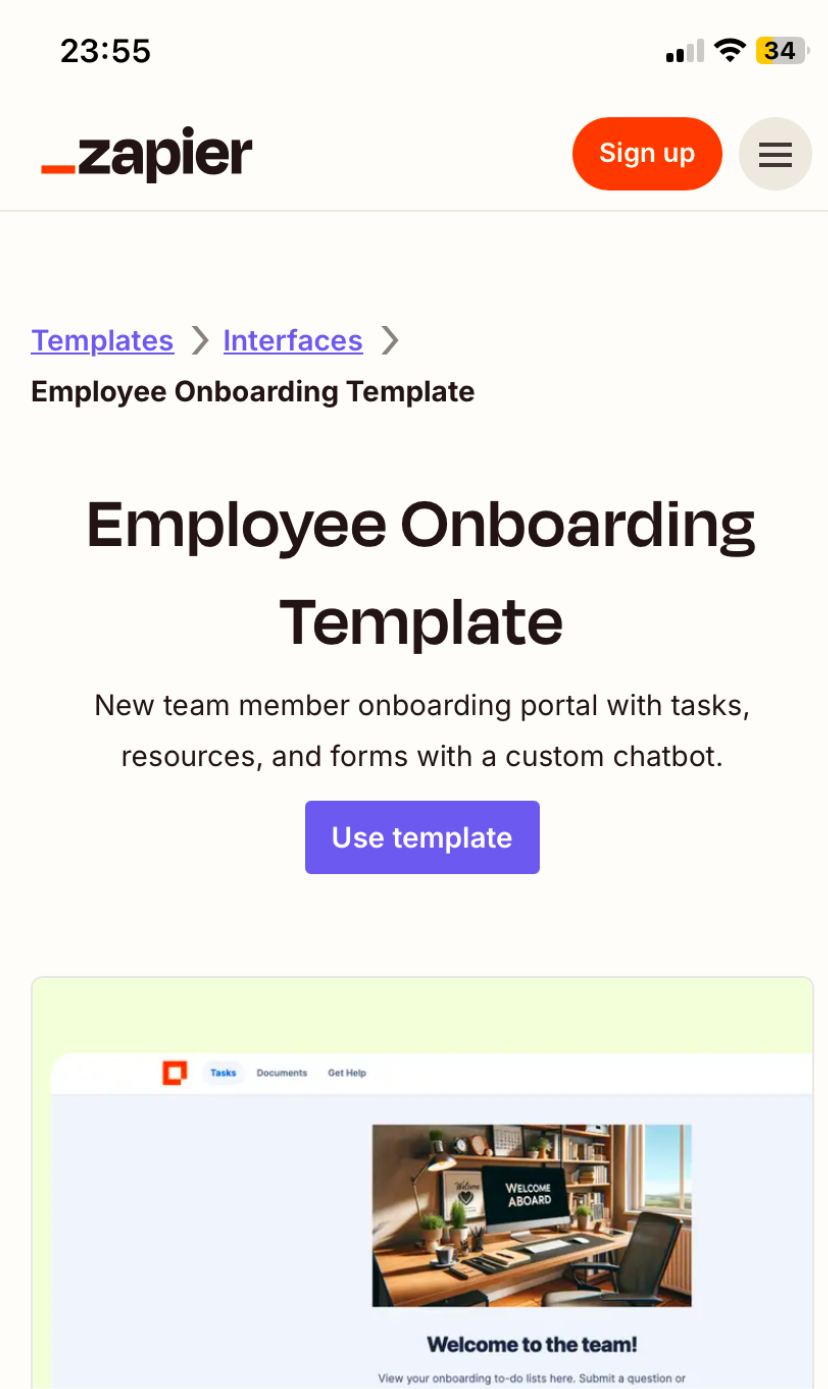
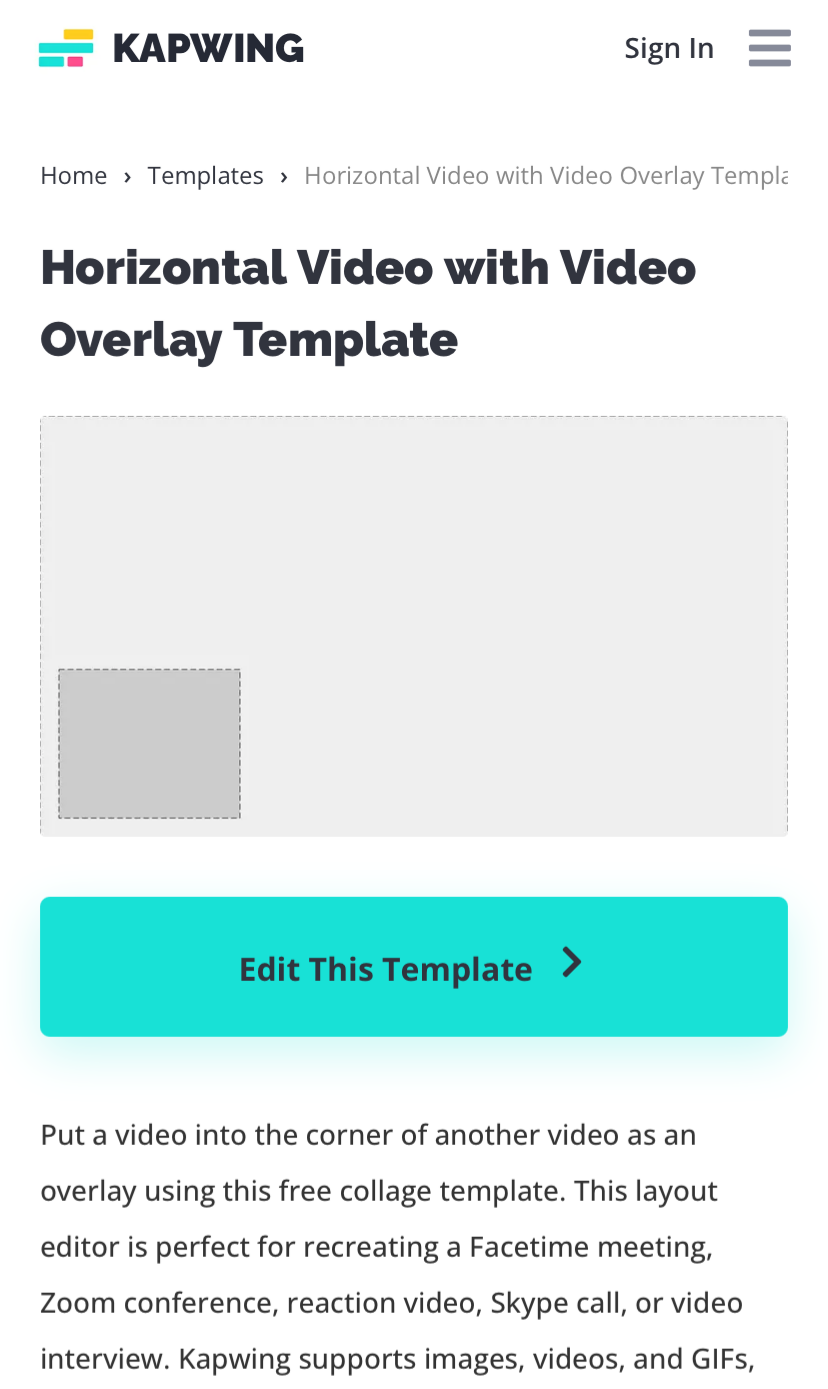
These template keywords target folks who want to use pre-designed templates to solve an obstacle or challenge they have.
Free templates are like teasers. They give the user a taste of what the SaaS product could offer them.
Just enough of a taste to impress the user but not enough to provide the complete experience.
No, the user will need to upgrade to a paid plan to get the full experience.
So in a nutshell, this is how it works:
First, you impress the user with the features provided in the free template.
And then you nudge them to sign up for a full subscription, so they can get access to more features.
You provide value upfront and then pitch your product down the line.
One of the oldest tactic in the SaaS SEO playbook.
- Capture specific intent: attract users who are looking for specific types of templates and are likely to be interested in tools that offer customisable solutions. So it’s fairly simple for you to pitch your product as that solution.
- Pitch your product upfront: Show off how your product can help users create, customise, and manage various types of templates, addressing their specific needs.
You sell yourself by pitching your product upfront, in a tangible way.
No flowery copy or 2-minute product demos – just real results.
The customer can put your product to the test there and then and sign up if they’re impressed.
If your SaaS product is a form builder, you might target template keywords like employee feedback survey templates or customer satisfaction survey form.
Create landing pages or blog content that provides examples of these specific templates, and explain how your form builder can help users easily create, customise, and deploy these forms.
Feature-specific keywords
- Example keywords: crm software with email integration or project management tool with gantt charts.
- Description: Feature-specific keywords attract users who are looking for software solutions with specific features that meet their unique needs or preferences.
Business size keywords
- Example keywords: enterprise hr software
- Description: Business-size keywords focus on the size of the company searching for the software. You’d be surprised at how common these keywords are.
For example, if your SaaS product is an HR management tool, users might search for enterprise hr software if they need a robust solution suitable for large organisations.
So then you can create content that highlights how your product meets the needs of enterprise clients, e.g. advanced reporting or scalability.
More coming soon